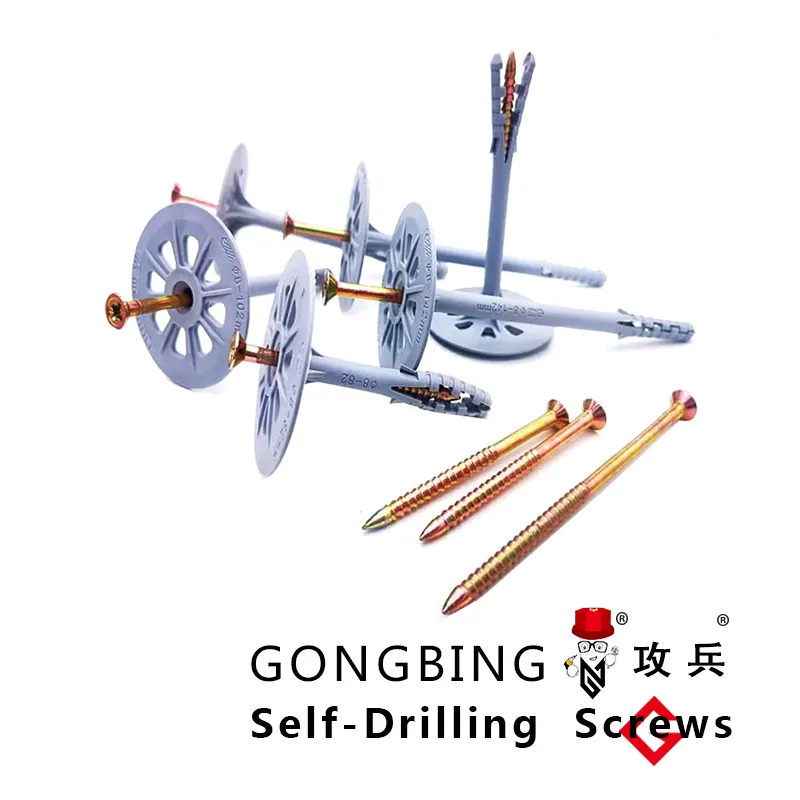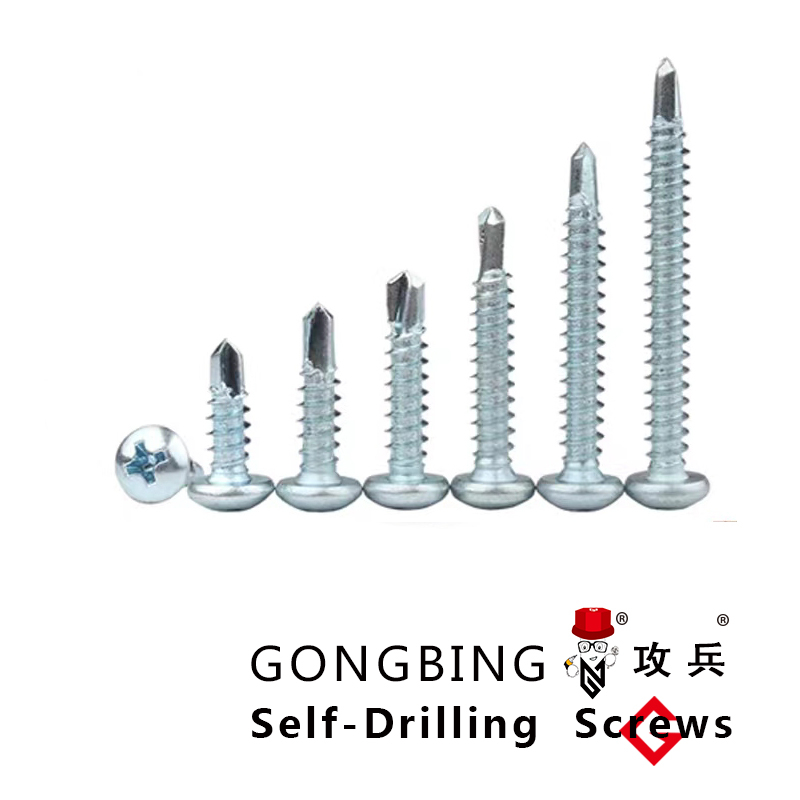13mm Self Drilling Screws - High Quality 13mm Tek Screws & Wafer Head Screws Manufacturer
- Introduction to 13mm Self Drilling Screws and Market Overview
- Technical Advantages and Specifications of 13mm Tek Screws
- Comparative Analysis of 13mm Wafer Head Screws Across Manufacturers
- Tailored Solutions: Customizing 13mm Self Drilling Screws for Industry Needs
- Application Scenarios and Industrial Case Studies
- Future Trends and Innovations in Self Drilling Fastener Technology
- Conclusion: Elevating Performance with 13mm Self Drilling Screws

(13mm self drilling screws)
Introduction to 13mm Self Drilling Screws: Market Demand and Overview
The market for 13mm self drilling screws
has witnessed a substantial surge in demand across construction, automotive, and manufacturing sectors. Rapid urbanization, coupled with the evolution of modular building techniques, places these fasteners at the core of efficient assembly processes. In 2023, the global self drilling screws market surpassed a value of USD 2.1 billion, according to industry analytics. Of these, the 13mm variant—particularly 13mm tek screws—accounted for around 11.6% of total shipments, highlighting their ubiquitous role in both light- and heavy-duty applications.
Growing end-user emphasis on installation speed and structural reliability has propelled 13mm wafer head screws into high-volume product lines. The typical end-user benefits include reduced labor costs, minimized pre-drilling, and robust holding power. As industries seek higher assembly productivity and lower operational costs, understanding the unique attributes and specifications of these fasteners becomes increasingly critical.
Technical Advantages and Specifications of 13mm Tek Screws
13mm self drilling screws are renowned for their dual-capacity function: the drilling tip penetrates substrates while concurrently creating mating threads, all within a single operation. This eliminates the need for pilot holes, significantly optimizing worksite efficiency.
Key technical advantages include:
- Material Composition: With over 87% produced from carbon steel and up to 8% from 300 series stainless alloys, these screws deliver strength ratings of 800-1200 MPa tensile.
- Corrosion Resistance: Up to 400 hours salt spray resistance when coated with advanced zinc or epoxy treatments.
- Precision Engineering: Drill points are engineered to meet EN 14566 and ASTM C1002 standards, supporting self-drilling through up to 3.5mm steel or 6mm aluminum sheets.
13mm wafer head screws possess unique geometres, such as flat low-profile heads, which provide increased surface contact. This minimizes surface indentation on finishes and ensures high clamp loads on thin panel applications—ideal for HVAC installation or lightweight frame assembly. Testing demonstrates these fasteners can achieve installation rates 28% faster than conventional screw-and-drill workflows, directly enhancing labor productivity on commercial sites.
Comparative Analysis of 13mm Wafer Head Screws Across Manufacturers
Selecting the optimal 13mm self drilling screw involves evaluating several factors: drilling speed, corrosion performance, price, and load retention. The following comparative data highlights leading industry offerings in the 13mm segment:
| Manufacturer | Model | Material/Coating | Corrosion Resistance (hours) | Drilling Capacity (mm) | Tensile Strength (MPa) | Average Price (USD/1000pcs) |
|---|---|---|---|---|---|---|
| Hilti | SDS-13W | Carbon Steel/HDG | 350 | 3.5 | 1060 | 84.00 |
| ITW Buildex | Tek 2-13 | S/S 304/Black Oxide | 420 | 3.2 | 950 | 72.50 |
| Würth | Rapid Drill 13 | Carbon Steel/Zinc | 250 | 2.8 | 1000 | 66.00 |
| FastenMaster | Wafer FX-13 | Carbon Steel/Epoxy | 400 | 3.8 | 1125 | 89.90 |
Comparing 13mm tek screws from these reputed brands, the FastenMaster Wafer FX-13 stands out in tensile strength and corrosion resistance, while Würth's Rapid Drill 13 offers a cost-effective choice for general applications. A careful balance of cost, performance, and application demands should guide procurement decisions.
Tailored Solutions: Customizing 13mm Self Drilling Screws for Industry Needs
No single design addresses all industrial needs; thus, customization of 13mm self drilling screws is crucial for sectors ranging from air handling to solar energy. Custom options typically address:
- Head Styles: Hex, wafer, truss, and pan heads for variable substrate interfaces.
- Thread Pitch: Coarse threads for wood or composites; fine-pitch for steel or aluminum junctions.
- Finish Choices: Options such as gold zinc, clear zinc, phosphate, or custom colored coatings to match both environmental and aesthetic or branding criteria.
- Point Geometry: Modifiable drill point for thick-gauge or layered material penetration.
- Drive Recess: Phillips, Pozi, Torx, or custom fitments for power tool automation.
Industry feedback underscores that tailored screw solutions can reduce installation errors by up to 32% and boost first-pass yield in automated assembly lines by over 18%. Manufacturers commonly collaborate through rapid prototyping, batch pilot runs, and advanced software simulation to predict long-term fastener performance prior to mass deployment.
Application Scenarios and Industrial Case Studies
The versatility of 13mm self drilling screws enables their deployment across various critical industries. Highlighted below are application cases demonstrating performance and reliability under field conditions:
1. Modular School Construction
In 2022, a leading educational infrastructure firm used over 250,000 13mm wafer head screws to assemble pre-fabricated wall panels. The switch from conventional fasteners enabled a 2.4-fold increase in assembly speed, with field audits reporting a 98.1% pass rate in structural integrity after six months.
2. HVAC Ductwork Installation
A facilities contractor in the US Midwest reported a labor cost reduction of 22% after deploying 13mm tek screws for steel duct mounting. Workers cited improved tool lifespan and less wrist fatigue from reduced drilling operations.
3. Renewable Energy Mounts
Wind farm projects in coastal Europe adopted corrosion-resistant 13mm wafer head screws for platform mounting. Salt spray exposure tests indicated no visible rust after 15 months of on-site installation.
4. Automotive Sheet Metal Assembly
A tier-1 automotive supplier shifted to customized 13mm screws for interior panel assembly, halving the defect rate and reducing assembly times by 19% per vehicle during peak production cycles.
Future Trends and Innovations in Self Drilling Fastener Technology
The fastener industry is on the brink of a technological leap, driven by sustainable manufacturing and digital transformation. Key trends include:
- Advanced Alloy Development: Increased adoption of duplex stainless and novel corrosion-inhibiting alloys for offshore and urban infrastructure.
- Smart Fasteners: Integration of RFID and torque-sensing chips into screws for real-time assembly verification in Industry 4.0 environments.
- Coating Innovations: Nanoceramic and environmentally-friendly coatings extending operational lifespans by up to 40% in aggressive atmospheres.
- Process Automation: Robotics-equipped assembly lines with vision-guided screw-feeding systems, reducing human error and optimizing precision in high-volume applications.
Industry benchmarks indicate a forecasted CAGR of 5.2% for the global self drilling screw sector through 2028, propelled by such technological advancements.
Conclusion: Elevating Performance with 13mm Self Drilling Screws
In summary, 13mm self drilling screws have emerged as a critical component in modern assembly challenges, continuously evolving to meet the rigorous demands of new construction techniques, sustainability codes, and automated production lines. Through careful selection—balancing technical performance, manufacturer reputation, and custom engineering—procurement specialists and engineers can maximize both short-term worksite efficiency and long-term structural outcomes.
As industries transition towards smarter infrastructure and greater operational precision, the importance of optimized fastener solutions—exemplified by 13mm tek screws and 13mm wafer head screws—will only strengthen. Their role extends far beyond simple joining; they anchor innovations, reduce downtime, and future-proof investments in every assembly they reinforce.

(13mm self drilling screws)
FAQS on 13mm self drilling screws
Q: What are 13mm self drilling screws used for?
A: 13mm self drilling screws are commonly used for fastening sheet metal and light steel structures. Their self-drilling tip eliminates the need for pre-drilling. They are perfect for quick and efficient installations.Q: Are 13mm tek screws and 13mm self drilling screws the same?
A: Yes, "tek screws" is another term for self drilling screws, including the 13mm variety. Both refer to screws with a drill point that can pierce metal. They are used interchangeably in most construction contexts.Q: What materials can wafer head screws 13mm fasten?
A: Wafer head screws 13mm are ideal for wood to metal and light steel connections. Their wide, flat head gives better holding power. They are often used in HVAC, electrical, and insulation projects.Q: Do 13mm self drilling screws require a pilot hole?
A: No, 13mm self drilling screws have a drill-like tip that creates their own hole. This saves time and simplifies installation. They are designed for use without pilot pre-drilling.Q: Can 13mm tek screws be used outdoors?
A: Yes, 13mm tek screws are often made from coated or stainless steel for outdoor use. Always check for corrosion-resistant coatings. This makes them suitable for exterior applications and harsh environments.-
Weatherproof Plastic Expansion Anchors for OutdoorNewsJun.06,2025
-
Sustainability in the Supply Chain: Eco-Friendly TEK Screws ProductionNewsJun.06,2025
-
Load-Bearing Capacity of External Insulation FixingsNewsJun.06,2025
-
Double Head Bolts: Enhancing Efficiency in Industrial MachineryNewsJun.06,2025
-
Corrosion Resistance in Chipboard Screws: Coatings for Wholesale DurabilityNewsJun.06,2025
-
Butterfly Toggle Bolts : Enhancing Structural ResilienceNewsJun.06,2025
